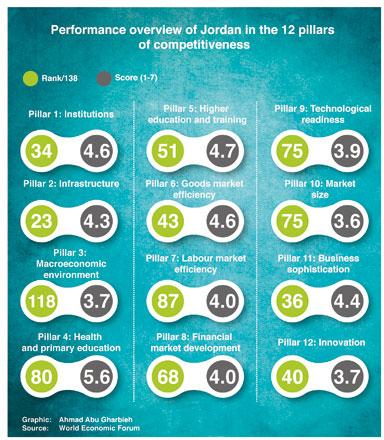You are here
Jordan 25th globally in availability of engineers, scientists
By Dana Al Emam - Oct 01,2015 - Last updated at Oct 01,2015
AMMAN — Jordan ranked 7th most competitive Arab country in the latest economic index, scoring as high as 25th globally on availability of engineers and scientists but as low as 142 out of 144 countries on ratio of women to men in the labour force.
Similar to last year, Jordan ranked 64 worldwide in the World Economic Forum’s (WEF) 2015-2016 Global Competitiveness Index (GCI), according to the report released on Wednesday.
The Kingdom, which was categorised as “efficiency driven”, registered an overall score of 4.2 out of 7 possible points across the 12 pillars and some 120 subcategories used in the report to measure the economic competitiveness of countries.
Jordan achieved the highest scores in the health and primary education (6) and higher education and training (4.7) pillars, while its lowest scores were in the macroeconomic environment, technological readiness, market size and innovation (3.7).
The WEF identified difficulty in accessing financing, an inadequately educated workforce, policy instability, tax rates, restrictive labour regulations and inefficient government bureaucracy as the major problematic factors facing businesses in Jordan.
Commenting on Jordan’s performance in the report, economist Maen Ensour said it was “unacceptable” for Jordan not to move up the ranking list as some countries ranked below Jordan in previous years have registered higher ranks this year.
He stressed the need for a “comprehensive” governmental plan, including suggestions from the private sector, to improve the Kingdom’s performance in all pillars, not only the lagging ones. “The plan has to be translated into applicable programmes,” he said.
Ensour, who is also a former Social Security Corporation director, added that the 2015 IMD World Competitiveness Yearbook and the World Bank’s Doing Business Report 2015 have come to similar conclusions.
“Enhancing competitiveness will directly impact living standards and development levels,” he told The Jordan Times over the phone.
In the subcategory of representation of women in the labour force, Jordan ranked 138 out of 140, while in the subcategory of strength of investor protection, the Kingdom ranked 121.
Switzerland, Singapore, the United States and Germany headed the WEF’s list, while Guinea ranked last, preceded by Chad and Mauritania.
Gulf Cooperation Council (GCC) countries came highest in the Arab world on the list, with Qatar ranked 14, followed by the United Arab Emirates (17), Saudi Arabia (25), Kuwait (34), Bahrain (39) and Oman (62).
“With geopolitical conflict and terrorism threatening to take an even bigger toll, countries in the [Middle East] region must focus on reforming the business environment and strengthening the private sector,” the WEF said.
Related Articles
AMMAN – Jordan's competitiveness ranking worldwide and regionally improved on the World Economic Forum’s (WEF) Global Competitiveness Index
Jordan's ranking in the 2014-2015 Global Competitiveness Index (GCI) improved by four places to 64th spot on a list of 144 countries, a rank the Kingdom held two years ago, according to the report released by the World Economic Forum (WEF) on Wednesday.
AMMAN — Jordan was ranked 45th among 136 world countries in the “Enabling Trade Index 2016” released by the World Economic Forum (WEF) and t

















